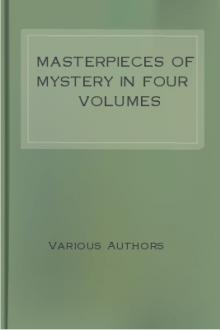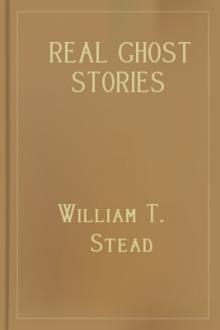Varney the Vampire; Or, the Feast of Blood by Prest and Rymer (ereader iphone .txt) 📗

- Author: Prest and Rymer
Book online «Varney the Vampire; Or, the Feast of Blood by Prest and Rymer (ereader iphone .txt) 📗». Author Prest and Rymer
"Believe me to be, dear sir,
"Your very obedient servant,
"To Henry Bannerworth, Esq."
Henry, after having read this most unobjectionable letter through, folded it up again, and placed it in his pocket. Clasping his hands, then, behind his back, a favourite attitude of his when he was in deep contemplation, he paced to and fro in the garden for some time in deep thought.
"How strange," he muttered. "It seems that every circumstance combines to induce me to leave my old ancestral home. It appears as if everything now that happened had that direct tendency. What can be the meaning of all this? 'Tis very strange—amazingly strange. Here arise circumstances which are enough to induce any man to leave a particular place. Then a friend, in whose single-mindedness and judgment I know I can rely, advises the step, and immediately upon the back of that comes a fair and candid offer."
There was an apparent connexion between all these circumstances which much puzzled Henry. He walked to and fro for nearly an hour, until he heard a hasty footstep approaching him, and upon looking in the direction from whence it came, he saw Mr. Marchdale.
"I will seek Marchdale's advice," he said, "upon this matter. I will hear what he says concerning it."
"Henry," said Marchdale, when he came sufficiently near to him for conversation, "why do you remain here alone?"
"I have received a communication from our neighbour, Sir Francis Varney," said Henry.
"Indeed!"
"It is here. Peruse it for yourself, and then tell me, Marchdale, candidly what you think of it."
"I suppose," said Marchdale, as he opened the letter, "it is another friendly note of condolence on the state of your domestic affairs, which, I grieve to say, from the prattling of domestics, whose tongues it is quite impossible to silence, have become food for gossip all over the neighbouring villages and estates."
"If anything could add another pang to those I have already been made to suffer," said Henry, "it would certainly arise from being made the food of vulgar gossip. But read the letter, Marchdale. You will find its contents of a more important character than you anticipate."
"Indeed!" said Marchdale, as he ran his eyes eagerly over the note.
When he had finished it he glanced at Henry, who then said,—
"Well, what is your opinion?"
"I know not what to say, Henry. You know that my own advice to you has been to get rid of this place."
"It has."
"With the hope that the disagreeable affair connected with it now may remain connected with it as a house, and not with you and yours as a family."
"It may be so."
"There appears to me every likelihood of it."
"I do not know," said Henry, with a shudder. "I must confess, Marchdale, that to my own perceptions it seems more probable that the infliction we have experienced from the strange visitor, who seems now resolved to pester us with visits, will rather attach to a family than to a house. The vampyre may follow us."
"If so, of course the parting with the Hall would be a great pity, and no gain."
"None in the least."
"Henry, a thought has struck me."
"Let's hear it, Marchdale."
"It is this:—Suppose you were to try the experiment of leaving the Hall without selling it. Suppose for one year you were to let it to some one, Henry."
"It might be done."
"Ay, and it might, with very great promise and candour, be proposed to this very gentleman, Sir Francis Varney, to take it for one year, to see how he liked it before becoming the possessor of it. Then if he found himself tormented by the vampyre, he need not complete the purchase, or if you found that the apparition followed you from hence, you might yourself return, feeling that perhaps here, in the spots familiar to your youth, you might be most happy, even under such circumstances as at present oppress you."
"Most happy!" ejaculated Henry.
"Perhaps I should not have used that word."
"I am sure you should not," said Henry, "when you speak of me."
"Well—well; let us hope that the time may not be very far distant when I may use the term happy, as applied to you, in the most conclusive and the strongest manner it can be used."
"Oh," said Henry, "I will hope; but do not mock me with it now, Marchdale, I pray you."
"Heaven forbid that I should mock you!"
"Well—well; I do not believe you are the man to do so to any one. But about this affair of the house."
"Distinctly, then, if I were you, I would call upon Sir Francis Varney, and make him an offer to become a tenant of the Hall for twelve months, during which time you could go where you please, and test the fact of absence ridding you or not ridding you of the dreadful visitant who makes the night here truly hideous."
"I will speak to my mother, to George, and to my sister of the matter. They shall decide."
Mr. Marchdale now strove in every possible manner to raise the spirits of Henry Bannerworth, by painting to him the future in far more radiant colours than the present, and endeavouring to induce a belief in his mind that a short period of time might after all replace in his mind, and in the minds of those who were naturally so dear to him, all their wonted serenity.
Henry, although he felt not much comfort from these kindly efforts, yet could feel gratitude to him who made them; and after expressing such a feeling to Marchdale, in strong terms, he repaired to the house, in order to hold a solemn consultation with those whom he felt ought to be consulted as well as himself as to what steps should be taken with regard to the Hall.
The proposition, or rather the suggestion, which had been made by Marchdale upon the proposition of Sir Francis Varney, was in every respect so reasonable and just, that it met, as was to be expected, with the concurrence of every member of the family.
Flora's cheeks almost resumed some of their wonted colour at the mere thought now of leaving that home to which she had been at one time so much attached.
"Yes, dear Henry," she said, "let us leave here if you are agreeable so to do, and in leaving this house, we will believe that we leave behind us a world of terror."
"Flora," remarked Henry, in a tone of slight reproach, "if you were so anxious to leave Bannerworth Hall, why did you not say so before this proposition came from other mouths? You know your feelings upon such a subject would have been laws to me."
"I knew you were attached to the old house," said Flora; "and, besides, events have come upon us all with such fearful rapidity, there has scarcely been time to think."
"True—true."
"And you will leave, Henry?"
"I will call upon Sir Francis Varney myself, and speak to him upon the subject."
A new impetus to existence appeared now to come over the whole family, at the idea of leaving a place which always would be now associated in their minds with so much terror. Each member of the family felt happier, and breathed more freely than before, so that the change which had come over them seemed almost magical. And Charles Holland, too, was much better pleased, and he whispered to Flora,—
"Dear Flora, you will now surely no longer talk of driving from you the honest heart that loves you?"
"Hush, Charles, hush!" she said; "meet me an hour hence in the garden, and we will talk of this."
"That hour will seem an age," he said.
Henry, now, having made a determination to see Sir Francis Varney, lost no time in putting it into execution. At Mr. Marchdale's own request, he took him with him, as it was desirable to have a third person present in the sort of business negotiation which was going on. The estate which had been so recently entered upon by the person calling himself Sir Francis Varney, and which common report said he had purchased, was a small, but complete property, and situated so close to the grounds connected with Bannerworth Hall, that a short walk soon placed





Comments (0)